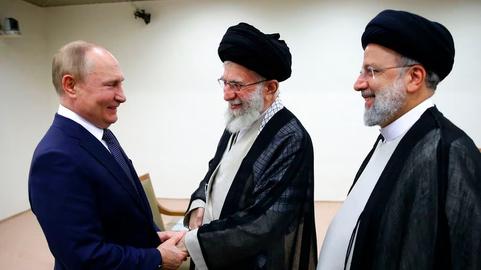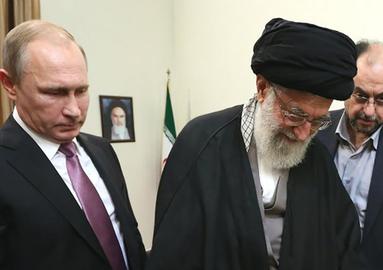Yevgeny Prigozhin's armed rebellion against President Vladimir Putin, which lasted for only a day when his Wagner mercenary group occupied Russian military facilities in Rostov-on-Don before a Belarus-brokered deal talked him down, can only be bad news for the leaders of the Islamic Republic of Iran.
Iran’s rulers have no enthusiasm for a potential further weakening of Russian President Vladimir Putin in the ongoing war with Ukraine. He is already seen in many quarters as a somewhat diminished leader and the apparent rebellion, however brief, only weakens him more.
Iranian officials, however, see Putin as the leader of a country that has maintained close ties with Iran since the collapse of the Soviet Union three decades ago. Both nations find themselves at odds with the West – leading in each case to western sanctions and international isolation.
Iran’s Supreme Leader Ali Khamenei, who has received Putin in Tehran on five occasions, openly commended Russia's unprovoked military aggression against Ukraine. He praised Russia’s invasion and told Putin that if he had not attacked Ukraine, "the other side would have initiated a war."
It is a remarkable departure for Khamenei, who, during his three decades in power, has rarely praised any leader whose country holds a permanent seat on the United Nations Security Council.
Khamenei’sbody language during his first meeting with Putin, following Russia's military intervention in Ukraine, may be likened to his encounter with Bashar Assad in Tehran after the civil war in Syria.
Embracing Assad, Khamenei took pride in having supported him through the crisis until victory was achieved.
Similarly, in the summer of 2022, Khamenei smiled and clasped Putin's hands while engaging with leaders from other visiting countries in Iran.
After cooperating and engaging in political rhetoric with the United States immediately after the JCPOA nuclear agreement, only to then launching provocative missile tests and slogans against Israel, supporting Russia in its military aggression against Ukraine represents Iran’s latest audacious venture and political gamble. Iran has also sent Russia military drones for use in Ukraine.
"We manufacture advanced missile and drone equipment. A few years ago, when their photos were published, they were dismissed as Photoshop. Now they acknowledge the danger posed by Iranian drones," Khamenei told Putin.
Not supporting the aggressor, which was previously thought to be a lesson learned from the experience of the 8-year Providing military support to an aggressor state – before Khamenei’s decision to align with Putin – was unimaginable among some Iranian politicians and represents a unique deviation from the Supreme Ruler's 34-year rule. Iran’s war with Iraq, between 1980 and 1988, also taught it to be wary of aggressors.
Khamenei’s rule also coincided with the end of the Soviet Union. Iran saw the former superpower collapse across its own borders in a matter of months. The end of the Soviet Union may have told the Islamic Republic that the threat of communism within its own borders had declined: but for Khamenei it was also an example of western interference and warned him to counter western policies.
By supporting Russia in its aggression against Ukraine, Khamenei likely saw an opportunity to challenge NATO, which he referred to as a dangerous entity in his meeting with Putin.
But Russia's failure to achieve its goals in Ukraine, as well as the brief Wagner rebellion, could turn this dream into a disturbed or even a nightmarish reality. And despite it being short-lived, the rebellion exposes Putin’s critical vulnerabilities; Khamenei has relied on Putin in recent years, both for geopolitical and domestic reasons, and to see the Russian president threatened must also threaten him.
Nor can Khamenei drop Putin – despite his uncertain future – by refusing to supply him with drones. Khamenei also offered no reaction to the Wagner rebellion. The only Iranian response has come from some media outlets associated with the country’s security apparatus – which said that Wagner was too weak to challenge the Kremlin and that news of the rebellion was just another western conspiracy.
Playing an indirect role in the Ukraine war – by sending Russia drones from Iran – may indeed turn out to be one of Khamenei’s gravest strategic mistakes.
visit the accountability section
In this section of Iran Wire, you can contact the officials and launch your campaign for various problems

























comments